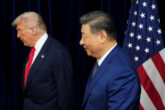January 12, 2022
Geopolitics Keeps Overruling Cyber Norms, So What’s the Alternative?
Whenever a new technology emerges as a national security issue, governments want to establish norms of behavior. We are seeing it with AI, with unmanned systems, with hypersonic technology — and we have seen it with cyberspace.
Setting norms can be useful. The process itself can have benefits: it requires governments to communicate and develop a better understanding of how different nations view challenging issues. When norms are agreed upon, even if voluntary and non-binding, they can make explicit what may be mutually beneficial to states.
Once governments accept the limits of political cyber norms, they can then adapt to the messier reality of cyberspace today.
Norms, however, will always struggle when they begin to hit up against the core interests of the nations involved. As cyberspace is now intrinsically tied into traditional geopolitical contests and conflicts—that is, core interests — norms can alter behavior only so much. But hope is not lost: Once governments accept the limits of political cyber norms, they can then adapt to the messier reality of cyberspace today.
Read the full article from Breaking Defense.
More from CNAS
-
Transatlantic Security / Technology & National Security
Look Before We Leap on Artificial IntelligenceThis article was originally published on The Dispatch. A debate about the role that artificial intelligence should and will play in society, and how it will affect humanity fo...
By Jon B. Wolfsthal
-
Technology & National Security
Caleb Withers on the Cybersecurity Frontier in the Age of AICaleb Withers, research associate at the Center for a New American Security, joins Kevin Frazier, the AI Innovation and Law Fellow at the University of Texas School of Law and...
By Caleb Withers
-
Technology & National Security
Prepared, Not ParalyzedExecutive Summary The Trump administration has embraced a pro-innovation approach to artificial intelligence (AI) policy. Its AI Action Plan, released July 2025, underscores t...
By Janet Egan, Spencer Michaels & Caleb Withers
-
Indo-Pacific Security / Technology & National Security
Sharper: Tech + ChinaRecent talks between President Donald Trump and Chinese Communist Party General Secretary Xi Jinping placed a spotlight on emerging technologies, from high-end chips to minera...
By Charles Horn & Sevi Silvia




